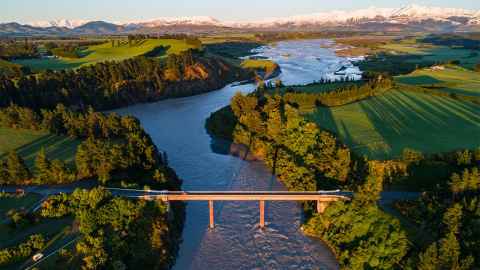Building bridges over troubled water
20 September 2019
Opinion: A classical approach to freshwater policy enforces well-established views, argue Maria Armoudian and Nicolas Pirsoul. They offer innovative alternatives.

Three years after the 2016 Havelock North drinking water crisis, fresh water quality has again become a pressing political issue in New Zealand Aotearoa. In light of our rare abundance of freshwater - in the top 10 countries worldwide per capita - the crisis has shone a light on the country’s political and policy problem of failing to protect this vital resource.
In the lead up to the 2017 general election, the two major parties, National and Labour, approached and framed water protection and mitigation in New Zealand Aotearoa in very different ways. National privileged a “blue-green” approach that emphasised economic development as a means to improve water quality. Labour framed the issue of access to quality water in terms of human rights and argued in its 2017 election manifesto that “access to safe drinking water is a basic human right and a critical measure of a first-world country’s infrastructure”. Despite these differences, both parties acknowledged the importance of improving fresh water quality.
After the election and forming of the coalition Government, Labour made water quality a priority and Minister for the Environment David Parker embarked on a journey to tackle this complex issue which has strong social and economic implications in a country where both agriculture and tourism play an important economic role. The Government developed a series of plans to revive the health of lakes and rivers in New Zealand. An important step in developing this new set of policies was the release by The Ministry for the Environment of the Environment Aotearoa 2019 report.
Last week, David Parker took the problem one step further and announced that the Government was launching a nation-wide consultation on environmental reforms and water quality in particular. A discussion document, Action for healthy waterways: A discussion document on national direction for our essential freshwater, was released and the public invited to attend information sessions and submit feedback. This consultation process is in line with a world-wide trend to increase public involvement in water governance, a trend which is already happening in New Zealand through collaborative water governance practices in Canterbury.
This consultative initiative is definitely laudable, but it may face many challenges and pitfalls. That’s in part because freshwater quality issues involve multiple stakeholders, often with strongly contrasting views and interests on water-related issues and how to manage this vital resource. Here in New Zealand, the variety of stakeholders and their conflicting interests in freshwater in New Zealand Aotearoa is highly complex: Farmers, environmentalists, Māori, recreational users and local governments all have different understandings and different stakes in freshwater management, and their needs often clash with one another. Without a fresh approach to water policy, the new efforts may fail to achieve the ideal of consensus.
The classical approach of consultation and feedback is part of the problem. Those who participate usually self-select based upon their already-formed strong views on the issue. The process of consultation, therefore, mainly serves to reinforce already well-established views on particular issues instead of seeking innovative ways of resolving a problem with greater consensus across different individual and/or collective pre-existing belief and interests.
There are alternatives. For example, James Fishkin, from Stanford University, developed a model of deliberative consultation that avoids the pitfalls of traditional consultation by creating panels of citizens, called “mini-publics”, through scientific random sampling of a given population. This method of deliberative polling produces a panel of participants working in small discussion groups to exchange ideas based on carefully designed, balanced and vetted material to ensure fair deliberation. Participants then go back and forth between small discussion groups and plenary sessions with experts in order to reassess their opinions and come up with new questions. At the end of the process, the findings are recorded and used to enlighten public debate and guide policy-making processes.
This process empowers and engages common citizens - instead of interest groups and ideological zealots - to be informed and influence policies, just as democracy should. Further, empirical evidence shows that when designed properly, these deliberative polls increase citizens’ understanding of particular issues, influence preferences and decrease staunch partisan positions while arriving at well-considered decisions.
This type of process would transform New Zealand’s water governance in a way that would support its democratic commitment, help assure our freshwater policies represent the interests of all New Zealanders while respecting Treaty commitments and preventing dominance of the process by powerful or vocal interest groups.
Dr Maria Armoudian is a lecturer in politics and international relations in the Faculty of Arts and Dr Nicolas Pirsoul is a lecturer in political theory at Massey University.
This article reflects the opinion of the authors and not necessarily the views of the University of Auckland.
Used with permission from Newsroom Building bridges over troubled water 20 September 2019.
Media queries
Alison Sims | Research Communications Editor
DDI 09 923 4953
Mob 021 249 0089
Email alison.sims@auckland.ac.nz